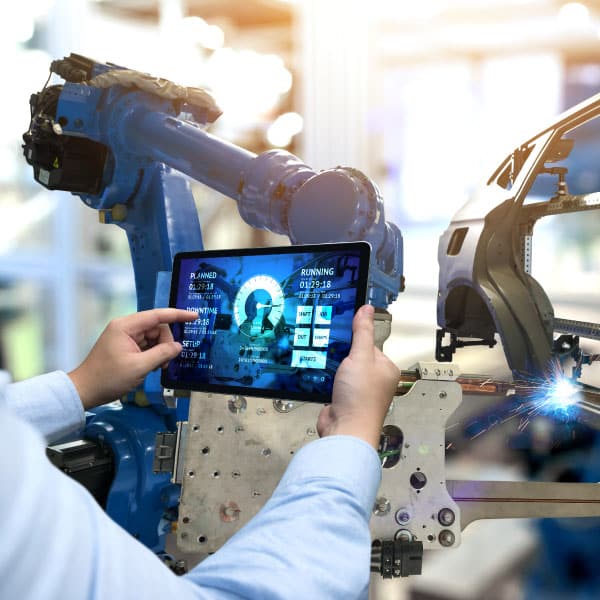WHAT IS ARTIFICIAL INTELLIGENCE?
We encounter artificial intelligence (AI) every day. Starting with our habits on the internet, to using smart devices to regulate the ventilation in the office, the heating at home, measure our blood pressure during physical activities, and analyse the quality of our sleep. Lately, the topic of artificial intelligence has become particularly relevant, because over the last year, artificial intelligence models which generate content that was previously only created by humans have begun to gain popularity, such as AI-generated pictures, project applications, essays, poetry, speeches and even opportunities to have a chat. This is the so-called Strong AI, which aims to create a technology that can think like a human and have the consciousness of an intelligent being, but is this even possible and do we know what human intelligence is and what its limits are?
We started the blog post by asking the well-known ChatGPT, what artificial intelligence is. Here’s the response we got:
“Artificial intelligence is a branch of computer science that deals with the development of computer programs and computer systems capable of performing tasks that would normally require human intellectual abilities. Artificial intelligence studies and attempts to create computer programs that can think, learn, analyse, conclude, and make decisions in a human-like manner. Artificial intelligence includes several sub-fields:
- machine learning: An AI subfield that focuses on algorithm development and modelling and allows a computer to learn from data and make predictions or classifications;
- deep learning: AI subfield of machine learning that uses neural networks and deep models to perform complex tasks such as image or speech recognition;
- natural language processing: algorithms and programs that allow computers to understand and analyse human language, as well as perform translation and create dialogue patterns;
- robotics: AI is used to create robots and devices that can understand and respond to their environment, perform certain tasks, and communicate with people.
Artificial intelligence has a wide range of applications, including medicine, finance, transportation, art, and many other industries. Artificial intelligence continues to develop and potentially impact our daily lives, offering new opportunities and solutions to complex tasks.”
To conclude, artificial intelligence is a sub-field of computer science that deals with the automation of intelligent behaviour by making computers do things that humans do better. In simpler words, if a computer program is able to come up with a solution by simulating human brain activity and thought processes, it can be called artificial intelligence. Read more about what AI is and how it affects our daily lives.



ARTIFICIAL INTELLIGENCE AND ITS POSSIBILITIES
The European Commission distinguishes between two types of artificial intelligence: software (virtual assistants, image analysis software, search engines, speech and face, text and character recognition systems) and AI embedded in the hardware of robots, cars, drones and internet apps. Artificial intelligence technologies have been around for more than 50 years, but artificial intelligence has experienced particularly rapid development in recent years. This became possible with the help of more powerful servers that are able to process large amounts of information in a short period of time. There are many areas where we use artificial intelligence quite frequently. Here are just a few examples:
Internet browser and smart assistants
One of the most noticeable examples is our activities on the internet. Every day, when we open our web browser and search for information we are interested in, search engines try to “remember, guess and select” from the vast amount of input provided by other users, to offer search results that are specifically catered to us. Similarly, smartphones with their many apps and functionalities have become our daily assistants and help us organise our daily routine, work, and business.
E-shops and the right advertisement at the right time
Artificial intelligence is commonly used in e-commerce and digital marketing. You must have noticed that shortly after you have visited a certain brand’s online store or searched for a specific product that interests you, similar offers magically appear on your Facebook or Instagram feed. The most advanced stores that use AI solutions have gone even further – after noticing that you have bought, for example, a new smartphone, next time they offer accessories, smartwatches and other goods specifically designed for that smartphone, instead of another phone of the same kind. AI makes personalised recommendations to people based on past searches and purchases or other behaviour online. The application of AI in commerce is extensive and it is very important in product optimisation, accounting, logistics, etc.
In the service field
When we call customer service on the phone, more and more often the conversation is started with a bot that answers standard questions, but the specialist only connects when the conversation drifts into a specific topic that the bot can no longer find answers for. Chatbots are constantly being trained and getting smarter and can successfully conduct many simple conversations without human intervention.
Financial services
Banks use artificial intelligence to track money transfers and verify that transactions are legitimate. Computer-based solutions have been used in the calculation of suspicious payments for a long time, for example MasterCard’s artificial intelligence and machine deep learning solutions look for parameters characteristic of fraudulent transactions and present them to specialists who further analyse these cases. Machine learning algorithms also play a role in stock exchanges, analysing changes in the price of stocks and predicting price fluctuations in the future. Processing huge amounts of data, artificial intelligence looks for similar conditions in previous records and evaluates the moves that have followed them.
Artificial intelligence in the translation industry
Lately, many technologies related to the translation industry have been developed, including automated machine translation, which means that translations are becoming faster and more accurate. AI-supported translation tools such as Google Translate, Deepl, Microsoft Translator, etc., have conceptually changed the translation industry, allowing the easy translation of large volumes of text from one language to another; however, automated translation tools are not always able to cope with specific nuances and cultural differences, as well as new everyday realities, for example, in the very recent past, our lives were changed in one day by Covid-19. In order for automated machine translation tools to translate about Covid-19, they needed to be “educated” about it, collect and test large amounts of data, and train language models. Therefore, in the translation industry, high-level professionals, often specialised in a certain type of translation (legal, medical, etc.) will always play an important role. We always recommend entrusting professional translators and editors with texts and documents intended for publication or printing, as well as specialised, confidential, and complex industry texts.
When to choose translations done by artificial intelligence?
Our office offers automated translation services with the Skrivanek NMT tool, which was created not only by Skrivanek language specialists but also by academics and experts from various fields. We offer different types of machine translation: automated machine translations without post-editing and automated machine translations with basic or full post-editing when the translation is equivalent to a human translation.
We recommend using automated machine translation without post-editing when you need to save time and translation costs and the finished product will be used by a small group of people for their own or company’s internal needs. If the translation is needed for communication with clients, business partners or colleagues, it is recommended to use machine translation with basic or full post-edit by a native speaker of the target language or review by an expert in the relevant field, because the machine translator creates so-called “hallucinations”, that is, it creates false translations.



FUTURE PROSPECTS
Artificial intelligence and the myths surrounding it
Since AI is developing faster than people outside of the IT field can understand and grasp, there are also several myths associated with artificial intelligence. One of the most popular ideas is that AI will take away people’s jobs. Understandably, we are afraid of rapid changes and their potential consequences, but experts say that people who are ready to grow professionally and acquire new skills will never be out of a job. Artificial intelligence has made people’s lives easier, increased productivity and provided room for creativity. This means that people will not lack work, but their duties and areas of responsibility will change.
Fans of the fantasy genre have come up with more futuristic scenarios of AI taking over the world and ruling humans; however, for AI to be able to “enslave” humans it would require human-like brainpower or consciousness to even make that decision. Despite the huge advances in science, consciousness and the potential of the human brain are still unexplored, so how could a computer program understand it better than us? AI is just a tool for solving complex problems based on human defined methods, algorithms, and other similar aspects.
From simple texts to intelligent discussions
Now artificial intelligence has become a teacher, a guide, an assistant and even a friend, providing answers to almost every question and confirming the ability to “think” (artificial intelligence has even passed several exams that were conducted to identify the way of thinking and thought processes of a person). Experts believe that AI holds the promise of significant positive changes in the future, including improved access to information, education, healthcare, and transportation. Artificial intelligence will become more and more common in companies, both in serving customers and ensuring the internal operation of the company in certain departments; AI-related growth is also expected in the health sector. But all this will also require more technical knowledge and a solution-orientated society. We can also not ignore the ethical concerns about the impact of AI, such as data protection issues, copyright issues, liability for incorrect or inaccurate information and the resulting consequences of human actions, users’ over-reliance on AI solutions and lack of data verification, which can lead to serious consequences. The world is rapidly and inevitably changing and we must learn to adapt and use opportunities positively, and responsibly, to promote positive development.

